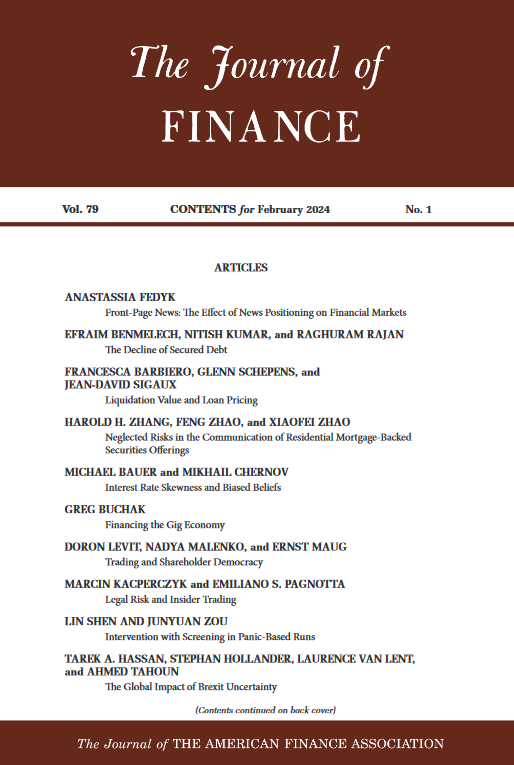全球银行套利资本
IF 9.5
1区 经济学
Q1 BUSINESS, FINANCE
引用次数: 0
摘要
我们研究了2016年10月实施的美国货币市场基金改革对全球银行资金供应和业务活动的影响。我们表明,改革对全球银行造成了巨大的负批发融资冲击。与传统的银行贷款渠道不同,全球银行对改革的主要反应是减少依赖无担保融资的套利头寸,而不是减少贷款准备金。我们讨论了危机后流动性监管和非常规货币政策的作用,以解释我们的发现,以及对银行业务模式和存款竞争的影响。本文章由计算机程序翻译,如有差异,请以英文原文为准。


Arbitrage Capital of Global Banks
We study the impact of the U.S. money market fund reform implemented in October 2016 on global banks' funding supply and business activities. We show that the reform induced a large negative wholesale funding shock for global banks. In contrast to the conventional bank lending channel, the primary response of global banks to the reform was a cutback in arbitrage positions that relied on unsecured funding, rather than a reduction in loan provision. We discuss the role of postcrisis liquidity regulations and unconventional monetary policy in explaining our findings, and implications for banks' business models and deposit competition.
求助全文
通过发布文献求助,成功后即可免费获取论文全文。
去求助
来源期刊

Journal of Finance
Multiple-
CiteScore
12.90
自引率
2.50%
发文量
88
期刊介绍:
The Journal of Finance is a renowned publication that disseminates cutting-edge research across all major fields of financial inquiry. Widely regarded as the most cited academic journal in finance, each issue reaches over 8,000 academics, finance professionals, libraries, government entities, and financial institutions worldwide. Published bi-monthly, the journal serves as the official publication of The American Finance Association, the premier academic organization dedicated to advancing knowledge and understanding in financial economics. Join us in exploring the forefront of financial research and scholarship.
 求助内容:
求助内容: 应助结果提醒方式:
应助结果提醒方式:


